
Executive MBA
23 months
£84,500
Blended: London, UK and online
Study for your MBA at a world-leading university
A first-class EMBA in London for executive leaders
The part-time Executive MBA programme is specially designed for business professionals. It aims to accelerate their careers within an existing trajectory or transitioning to a new business context or role.
The programme is delivered through a combination of online and in-person teaching (blended learning). This approach helps reducing the number of days you need to spend away from the office.
The Imperial Executive MBA ensures you develop strong leadership skills through the Executive Leadership Journey. The carefully curated core modules prepare you for senior general management positions by mastering fundamental business topics.
In your second year, you will build upon this knowledge. You will gain specialist skills and expertise through our wide range of elective modules. You will also participate in thematic immersion experiences such as exposure to fintech in Zurich, deep tech in Boston and med tech at Imperial College London, as well as a Capstone project in an emerging European tech hub. This will help you better understand the global business environment.
With a focus on leadership, technology and building your global network, our Executive MBA provides a first-class opportunity for success.
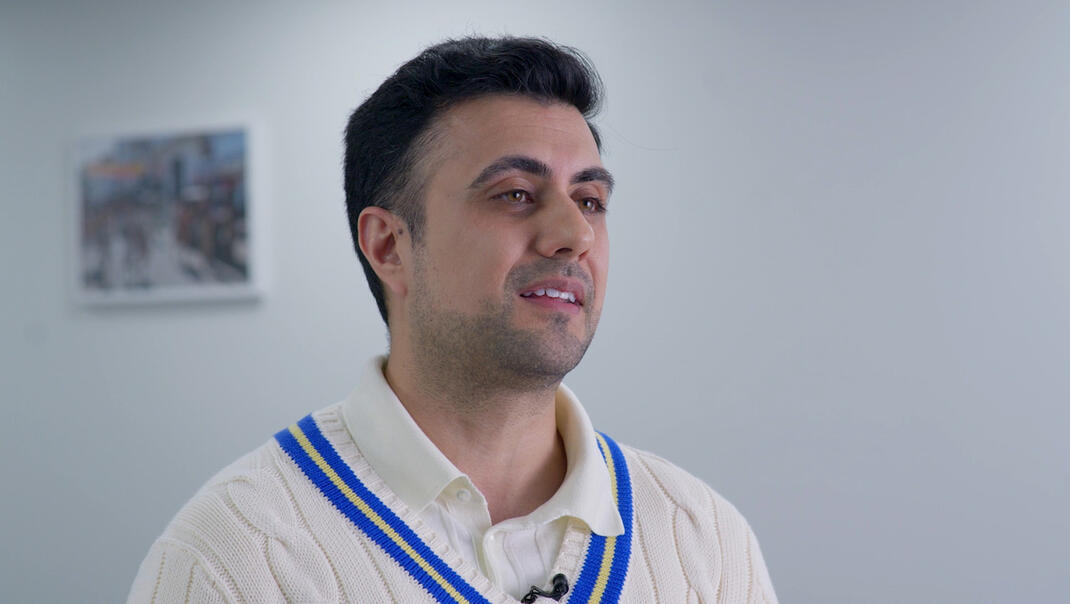
Hear from our Executive MBA students on their experience and learnings

Balance work and study
The Executive MBA fits around other commitments such as work and family, with a mix of online and on-campus teaching to offer flexibility. Keep your existing career on track, while still investing in yourself and driving your career progression.

Grow your network
Networking is a key focus of the Executive MBA. Regular events foster a professional network, connections and potential employment opportunities. As an EMBA alumnus, you will be invited to join the Imperial EMBA Club which connects EMBA alumni.
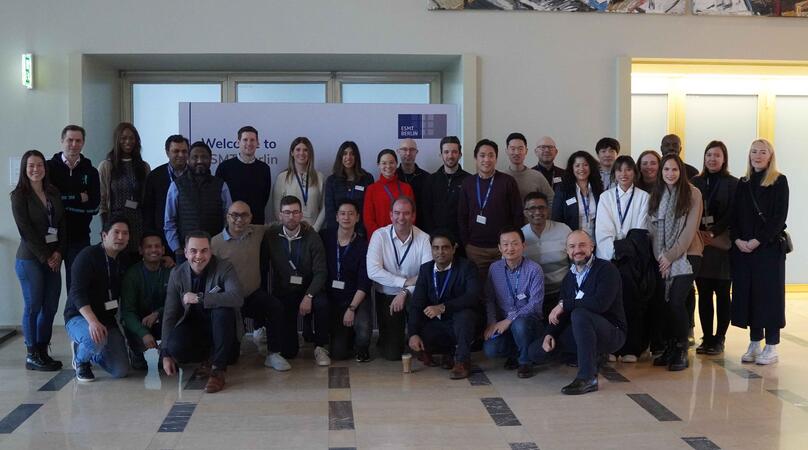
Immersion experiences
International business experience is embedded into our programme through a series of global modules and electives. Three thematic immersion experiences have been designed to give you first-hand knowledge of fintech, deep tech and med tech ecosystems.
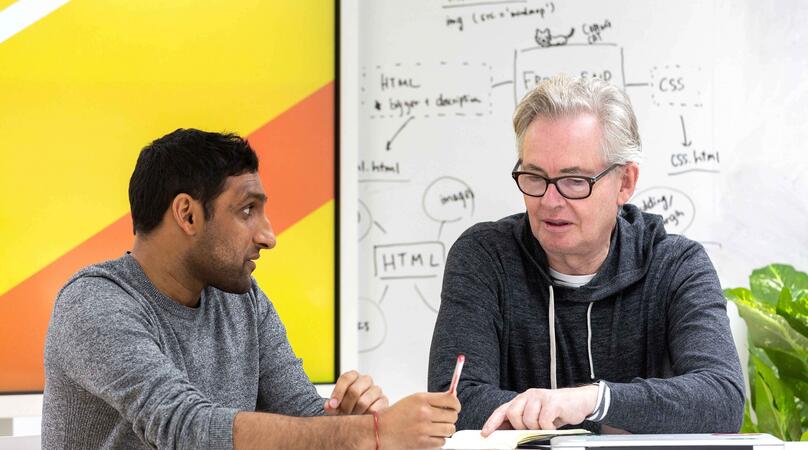
Future-facing curriculum
Our Leveraging Generative AI for Sustainable Business Value and Emerging Tech for Executives: Quantum, Climate, Ledger and Beyond modules provide an applied and executive-focused understanding of frontier technologies and their strategic implications

Lifelong learning
As an EMBA alumnus, you can come back to audit an elective module every year for free. We also host Milestone Reunions which you can attend at five-, 10-, and 15-years post-graduation, allowing you to stay up to speed with the latest faculty research

London location
Study in a global hub for business and finance, learn across our South Kensington and White City campuses, and benefit from our relationships with major employers, offering valuable industry connections and helping you build a global perspective.
Programme content
The Imperial Executive MBA is a part-time 23-month programme. You can apply your newly acquired knowledge and skills immediately in the workplace.
In your first year you will be required to come to campus every three to four weeks on a Friday and Saturday. You will attend four four-hour class sessions, for an intensive and focused learning experience.
The curriculum covers a wide range of business topics and includes a business leader speaker series. These will provide you with a comprehensive understanding of business principles and practices. You will also gain the analytical and strategic skills necessary for effective leadership.
This unique programme offers insight into game-changing technologies and their business applications, addressing ethical and societal implications. You will examine businesses tackling grand challenges, revealing strategies for impactful change.
Our year-long Executive Leadership Journey will enhance your self-awareness to leverage your strengths. You will receive support by your personal career coach.
In your second year, you can pursue your particular interests and build specialised knowledge through elective modules. You will also have the chance to participate in an immersive Capstone project in a digital hub such as Malaga or Lisbon.
View the Executive MBA 2026 term dates
Programme structure is subject to change and will be confirmed prior to the programme start date.
This comprehensive preparation ensures that you are well-prepared for the academic rigour ahead. You will also be thoroughly equipped to maximise the benefits of your programme.
Online pre-study modules
Before your programme starts, you will be expected to complete online pre-study modules. These will be available on Canvas, our virtual learning environment (VLE). These include primers in key areas including data analysis, finance, accounting, maths, corporate sustainability, social innovation and ethics.
Induction week
Your Executive MBA induction will take place on our South Kensington Campus in London. This is the chance for you to meet the rest of your cohort, faculty and programme staff.
This three-day induction will lay the foundations of your Executive MBA experience. As well as a programme introduction, you will partake in several lectures and activities to give you a taste for the programme.
Each core module is assessed via some combination of exam, coursework (either group or individual) and class participation.
Accounting and Corporate Reporting Analysis
Critical skills for business leaders include understanding the language of accounting and mastering financial analysis in day-to-day and strategic decision-making. This module will focus on:
- The use of accounting for financial management and reporting
- Explaining the techniques of financial and management accounting
- Examining the relevance of these techniques to broader issues such as decision-making and management control in organisations
Additionally, you will gain insights into:
- How business performance is measured
- How business decisions can be structured and analysed
Corporate Finance
This module will provide you with a foundation in the theoretical tools to analyse modern financial markets and the decisions of corporate firms. The module covers a variety of topics in corporate finance. It focuses on how firms and individuals (investors) make financial decisions.
We first want to understand the role that financial markets play in the economy; the role of financial intermediation. Then, the module is divided in two parts: valuation and capital structure.
Part one: Valuation
This part explains how companies select and value assets that they want to invest in (the left-hand side of the balance sheet). Key topics include:
- Present value techniques
- Basics of financial statements and cash flow calculation
- Investment rules and project evaluation
- Valuation of securities, such as bonds and stocks
- Portfolio theory and the Capital Asset Pricing Model (CAPM)
Part two: Financing and Risk Management
This part explores how companies finance their activities and manage risk. It examines the factors influencing “optimal” capital structure. It also looks at how these factors create value on the right-hand side of the balance sheet.
Corporate Innovation and Intrapreneurship
The corporate innovation & intrapreneurship module provides a unique opportunity to enhance your knowledge, skills and experience in:
- Understanding innovation at industry and company level
- Setting up processes and procedures to foster corporate innovation
You will be guided through:
- Different strategies implemented by new ventures
- How corporates adopt ideas from the entrepreneurship community, such as acceleration, incubation, and venture capital as tools for corporate renewal during the live sessions
In addition, you will embark on a live experience through negotiating a term sheet. This is typically used in corporate entrepreneurship and venture capital environments.
Economics for Business
This module aims to equip you with the tools and concepts economists use to:
- Understand how market conditions are determined
- Analyse the impact of the economic environment on business performance
By the end of the module, you will develop an understanding of economic forces and the ability to apply economic analysis to problems related to business strategy and managerial decision-making.
Emerging Tech for Executives: Quantum, Climate, Ledger & Beyond
The pace of technological innovation is accelerating. This course offers executive participants a structured, accessible introduction to some transformative emerging technologies like quantum computing, distributed ledger technologies (DLT/blockchain), climate technologies and risk management tools—alongside a deep dive into the risks and opportunities they create across sectors. This course demystifies each technology by starting with the fundamentals.
Leveraging Generative AI for Sustainable Business Value
Generative AI (GenAI) is transforming the way businesses operate, from automating complex tasks to enhancing decision-making and innovation. However, to truly leverage its potential, executives must rethink how AI interacts with data, language, reasoning, and knowledge, and understand how to strategically integrate and apply GenAI to drive business value.
This interactive class equips executives with a fresh perspective on GenAI’s capabilities, practical insights into its business integration and applications, and hands-on experience through case-based learning.
Marketing Management
Among business disciplines, marketing is the primary contact point between a business and its customers. Appreciating customer needs and how to marshal the resources of an organisation to meet those needs are crucial skills in today’s business world.
This module develops a general management approach to making, planning and evaluating marketing decisions, from both strategic and tactical perspectives.
You will learn how marketing decisions contribute to overall business performance and how they are affected by organisational and environmental influences. We will define and explore fundamental marketing terms, concepts, principles, ideas and theories. We will discuss the role of marketing in an organisation, explore the link between marketing and customer value creation.
You will learn how to think critically about marketing, how to use the marketing toolkit to gain competitive advantage, learn about the product life cycle and how to build customer relationships, as well as retain their loyalty. We will talk about branding, channels and promotions, and explore the opportunities presented by traditional and digital marketing communications.
Organisational Behaviour
This module covers the major factors that shape organisational behaviour and effectiveness. Key topics include:
- An analysis of organisational behaviour at three levels - the micro (individual), the meso (team), and the macro (organisational)
- Examining how activities at each level contribute to organisational performance and effectiveness
You will:
- Learn key concepts to improve organisational performance
- Acquire necessary tools to design organisations that thrive in unpredictable environments
- Develop analytical, problem-solving and leaderships skills
- Understand the dynamics that affect individuals in organisations, including culture, decision-making, group conflict, power structures, and wider social dynamics
Responsible Leadership and Corporate Success
The module will focus on a number of themes and will involve a blend of activities. We start the module studying individual aspects of leadership and as the module progresses, we will pay more attention to organisation-based aspects, finishing off with sessions for personal action planning.
All through the module we will keep coming back to the question of ethical responsibilities and spend time thinking through the challenge of responsible leadership.
By the end of our time together, you will not only have a more thorough awareness of the personal and social characteristics that shape you as a leader, but you will have a firm contract for moving forward with your personal leadership action plan.
Thus, this module should be thought of as an initial assessment of your position at the beginning of what is going to be a stimulating personal, group and academic journey.
Strategy
This module primarily focuses on ‘business strategy’: where and how a single business company or a business unit of a larger corporation competes in its business.
It will also introduce ‘corporate strategy’ which is about how multi-business corporations should make decisions around the scope of the businesses in their portfolio and how they should manage them.
The prime focus is on firms participating in competitive markets, some ideas are also relevant to other kinds of organisations, such as not-for-profit sector.
The module will help you:
- Developing the ability to assess if a strategy is likely to be successful
- Exploring how managers can develop new or improved strategies
- Understanding the organisational process of strategy development and strategy implementation
There are many different ways to approach an understanding of business (and corporate) strategy. This module is based on a framework which sees the role of a strategy in terms of (1) creating value and (2) capturing value.
We will discuss how this core framework relates to other well-known frameworks such as Porter’s five forces and Blue/Red Oceans.
We will also discuss why having an explicit strategy can be both a blessing and a curse – which explains why successful firms often subsequently fail.
1. Online modules
2. Two-week: Monday & Tuesday (week 1), Thursday & Friday (week 2)
3. Weekend: Thursday afternoon, Friday, Saturday, and Sunday morning
4. IB Glocal Electives: intense study abroad programmes led by Business School faculty
Electives use coursework and class participation for assessment. You can also apply to sit in on an additional two electives for which you will not be assessed.
We also offer a Final project as an elective, where you’ll work on a real business problem and demonstrate your decision-making and leadership abilities.
Analytics and Operations
Big Data, AI & Machine Learning (On-campus)
Business Analytics (On-campus)
Data Analytics and Visualisation for Business
Operations Management (Online)
Entrepreneurship and Innovation
Design for Business Transformation
Digital Business Model Design (On-campus)
Entrepreneurial Finance and Venture Capital (On-campus)
The Entrepreneurial Journey
Leading Social Innovation (On-campus)
Venture Capital Finance (Online)
Responsible Digital Innovation: Ethics at Work
Finance
Asset Management (On-campus)
Finance for Net Zero
The Fintech Revolution: New Markets, Models and Opportunities (On-campus)
Finance in Cleantech
Entrepreneurial Finance and Venture Capital (On-campus)
Mergers and Acquisitions (On-campus and online)
Pricing Strategy (On-campus)
Private Equity (On-campus)
Venture Capital Finance (Online)
Leadership and Organisation
Decision Making for Leaders
Family Business (On-campus)
Leadership (On-campus)
Leading and Executing Strategic Change (On-campus)
Leading Social Innovation (On-campus)
Strategy and Leadership in a Digital World (On-campus)
Marketing
AI Strategies in Marketing Innovation and Consumer Behaviour
Brand Management (On-campus)
Marketing Analytics (On-campus)
Pricing Strategy (On-campus)
Sustainable Marketing & Consumption
The Psychology of Sales: Mastering the Mindset to Drive Results
Strategy
Breakout Strategy (On-campus)
Design for Strategic Transformation
Energy Business (On-campus)
Global Strategy (online)
Shaping Frontier Markets
Strategic Networking (On-campus)
Strategy and Leadership in a Digital World (On-campus)
Sustainability and Competitive Advantage (On-campus)
Advanced Strategy in a Stakeholder Economy (Online)
Digital Business (Online)
Final Project
The Final Project is a formal report consisting of up to 15,000 words completed in the second year of the programme. This elective allows you to address a real business problem—you can focus on an issue facing your current employer or an industry of interest.
One of the most important elements of leadership is the ability to create, propose and defend ideas that add value, solve problems or leverage untapped opportunities. During the Final Project, you will demonstrate your analytical skills. You will develop a strategy and implementation plan that adds real value to your employer.
This is a great opportunity to demonstrate your decision-making and leadership abilities. It highlights your potential as a senior business leader.
Our Executive MBA is designed from the ground up to accommodate the busy schedules of senior executives. It ensures that students receive the best possible learning experience within these constraints.
Our award-winning IDEA Lab and online tutors will ensure that you are supported through your whole learning journey.
You will be expected to complete approximately eight hours of online material per module prior to each campus weekend.
Each block of preparation is split into manageable chunks of up to one-hour. These can be completed at a time and pace that best suits you. Throughout the online preparation blocks, there are discussion points which will be drawn upon during the in-class sessions, ensuring a direct connection between learning online and on campus.
Executive Leadership Journey
The year-long Executive Leadership Journey will enhance your awareness of your own and other’s strengths. You will work closely with a Careers consultant throughout the programme. Together, you will develop a plan for your future career trajectory. You will also gain insights into yourself and build essential leadership skills.
Whether you want to accelerate your career within your current organisation, or explore new opportunities, the Executive Leadership Journey will help you maximise your potential.
Global Immersions
As part of your elective modules, you will complete three immersions developing your knowledge and understanding of deep tech and entrepreneurship ecosystems. These experiences include enhanced ecosystem exposure while bringing industry in the classroom.
Our Global Immersions themes include:
Fintech & Business [Zurich] This is a three-day residency in collaboration with ETH Zurich, a leading tech university. It has an active Financial Hub and will give you an opportunity for a deep dive on fintech including the digitalisation of financial assets.
Medtech & Business [London] This is a three-day immersive module at Imperial, White City organised by Imperial's deep tech entrepreneurship institute. You will immerse into the med tech business which sprouts out of Imperial and get familiar with entrepreneurial initiatives and med tech challenges.
Deep Tech and Business [Boston] Your last three-day immersion will take you to MIT in Boston to get familiar with their new technical developments in deep tech such as fusion technology, new materials and quantum, and how these will change business decisions in the future.
Future destinations for the Executive MBA Global Immersions are subject to change. Imperial Business School reserves the right to alter the locations when required.
Please note that whilst the School covers teaching, accommodation, local travel and some meals, you will be required to pay for flights, transfers and other meals.
Capstone
The Capstone module takes place in a European tech hub over a five-day period during your second year and provides a practical, immersive opportunity to apply the knowledge, frameworks, and skills developed throughout the programme.
Working intensively in multi-disciplinary teams, you will be required to draw upon your analytical capabilities, strategic thinking, and ability to operate effectively under time pressure. You will develop and defend a viable business case, evaluate the commercial potential of new ideas, and apply a structured approach to market research, industry analysis, and entrepreneurial strategy.
Global Experience Week
Global Experience Week takes place during the summer term. It is an unforgettable opportunity that MBA students eagerly anticipate each year.
You will learn about the challenges faced by local organisations. You will also explore how a country’s business environment influences their operations.
Past Global Experience Weeks have included the Nordics. There, they examined how businesses can transform to address climate action.
You will choose from the following locations aligned with our key topics:
Brazil – Market Trends in the Marvellous City
Kenya – How can business address inequality?
The cost of this trip is not included in your tuition fees.
IB Glocal Electives
Optional four-day international experiences giving you the opportunity to explore contemporary global business problems with a local perspective. Gain valuable insights into international issues within a specific geography. Benefit from the in-market exposure and teaching that these trips offer.
These trips are shared across the MBA portfolio giving you the opportunity to build new connections. Previous locations have included Houston, Milan, Singapore.
The cost of this trip is not included in your tuition fees.
Global exchanges
The optional Global Exchanges programme allows you to increase your international exposure and connect with a global community. You can also build your network by taking advantage of specialised electives at one of our partner schools.
Admissions
Applications for the January 2027 intake are now open.
Discover our admissions process for the Executive MBA. Find entry requirements, how to apply, and key dates and deadlines.
We operate a staged admissions process with several deadlines throughout the year. This programme is highly competitive, so early application is advised. This will put you in a stronger position to be considered for a scholarship. It will also provide access to exclusive admitted students events.

Fees and funding
Choosing to pursue an MBA is one of the most important decisions you will make and is a substantial investment in yourself.
Many of our students fund their studies through multiple funding sources. We offer a wide range of awards, including a number of full scholarships to the most talented applicants. We’ve also provided information about the different financing options available to you.
What our students say

“The Business School's strong network of alumni, industry connections, and corporate partnerships has provided invaluable opportunities for networking, mentorship, and accessing new career prospects.”
Class of 2026
Meet the classClass profile book
Find out more about the people who study on our Executive MBA; their backgrounds, job roles, companies, and career aspirations in our class profile book.

MBA information session
Wednesday 25 February
12.00 - 13.30
Online, Zoom
Explore how your MBA from Imperial can transform your career!
Get more information on our full-time and part-time MBA programmes, receive tips for submitting a competitive application, and gain a sense of what it means to be part of the vibrant Imperial community.
Next steps
Career impact
As an Executive MBA student, you get complete access to Careers. This includes a personal career coach, throughout your studies and beyond. Whether you are pursuing an MBA to accelerate progression in your current industry or you wish to make a transition, Careers will provide extensive support and resources to support you on your MBA journey.
(Employment outcome refers to the class of 2024)

“My Executive MBA journey is giving me the knowledge and the skills needed to become a better leader. This programme shows that it takes time, effort, and willingness to continue learning to identify my leadership style and improve my communication skills.”
Meet your faculty
Our faculty are thought-leaders in the field of business. They combine theoretical knowledge from their cutting-edge research with the latest practical insights. These insights come from their extensive work with industry and government.
The majority of our Executive MBA faculty are doctorate-degree holders. They have experience of consulting or working for major companies. These include the Boston Consulting Group, BP, EDF, Ernst & Young, the European Commission and more.


Kevin Corley


Cloda Jenkins



Omar Merlo

Celia Moore

Christopher Tucci

Start your MBA journey today
FAQs
To be eligible to apply for the programme, you would normally require:
- Ten years’ relevant postgraduate work experience; in exceptional circumstances, we will consider candidates with over eight years’ experience who can demonstrate strong significant management experience
- You will need at least a UK Second Class Honours or international equivalent or an acceptable professional qualification
- English language test results (if applicable).
We accept a wide range of international qualifications for postgraduate study at Imperial.
We've provided general guidance in the country and region index. Here, understand how qualifications awarded by public institutions overseas may satisfy our minimum academic admission requirements.
We review our requirements annually. Updates usually happen in September each year before the next academic year of entry.
If your country or region is not listed, please contact the relevant Admissions team for further information.
Applications to the Executive MBA are made online – we do not accept paper applications.
Please refer to the how to apply section of our Admissions page. It outlines the documents you are required to submit with your application.
At Imperial, we work with admissions rounds. By submitting your application into an admissions round, you will be able to plan around the next steps in the process and see the timeline for decisions to be made. If you wish to be considered, please follow the dates listed on the key dates and deadlines page.
Please email the Executive MBA Recruitment & Admissions team if you would like feedback on your application. Please note that whilst limited feedback can be provided. The decision of the academic selectors is final and it will not be possible for your application to be reconsidered.
GMAT / GRE is not required for admission to this programme.
However, if you have if you have already sat or intend to take GMAT (old or new test) or GRE, you are welcome to submit your results. A good score overall can add weight to your application – particularly if you feel that your degree performance does not reflect your academic potential.
To submit a GMAT score, you must request for it to be sent to Imperial Business School using the code S22-7S-16.
The Executive MBA is a 23-month programme. In your first year of study, you will attend lectures at our campus in South Kensington, London for two days every month. You will also take part in a residency in China and a three-day study trip to a European city.
In the second year, you will complete electives, a residency in the United States and a final project. Please refer to the Programme page for more information on class timetables.
For each module, you will be expected to complete approximately 12-20 hours of class time. Additionally, you will need to spend three hours for every one hour in the classroom.
Our programmes are intensive periods of study. Contact hours form only part of the activity that you will be asked to undertake. You will be required to devote time to:
- Preparing for lectures
- Undertaking background reading
- Working in groups
- Completing assessments (both individual and in groups)
- Revising for exams
A significant amount of time will also be allocated to career planning and development . You’ll also be expected to actively contribute to the Business School community.
This is not an exhaustive list. However, it provides you with a flavour of what you can expect from your time as a student at Imperial Business School.
For information on the fee and deposit amount, please visit the Admissions page
Self-funded students will have the option of selecting to pay their fees in instalments. This option will be made available at the time of responding to your offer. For further information about the instalment plan, please contact our Tuition Fee team.
There are a number of scholarships available to Executive MBA candidates.
To be considered for an award, you must submit your MBA application. Ensure it is submitted before the deadline listed under the specific scholarship page. To receive notifications about scholarship deadlines and programme news, please join our mailing list.
Please note that specific scholarship schemes may have earlier application deadlines. Make sure to check the details on the Scholarships webpage carefully before applying.
Please be aware that you do not need to submit a separate scholarship application to be considered for an award. All applications received by the stated deadline will be considered. Scholarship decisions will be made in conjunction with your Executive MBA application decision.
Students may also obtain other sources of funding. A list of potential funding sources can be found on the financing your MBA page.
Please contact the Tuition Fees team with any queries you have regarding the Careers and Professional Development Loan.
Please contact the Tuition Fees team with any queries regarding your deposit or tuition fee invoice.
If you are being sponsored by an organisation that will be responsible for paying your tuition fees, you must provide acceptable proof of the award.
Satisfactory evidence of sponsorship is usually regarded as an original, dated and duly authorised letter from your sponsor. The letter should be on headed paper and include the following:
- Your name and College Identifier Number
- The programme for which you have been offered a place
- The amount of fees which will be paid by your sponsor (please report in GBP)
- The address to which the invoice should be sent
- Any Purchase Order Number required
- Confirmation that the fees will be sent directly to Imperial College
Sponsorship letters should be emailed to both the MBA Recruitment & Admissions team and Tuition Fees team to the following email addresses: emba@imperial.ac.uk and tuition.fees@imperial.ac.uk
If you are coming to Imperial for a short period of study, and you do not already hold immigration permission that allows you to study the in-person requirements of the course, then you may need to enter the UK under the Standard Visitor route. The Standard Visitor route allows students to come to the UK for a period of up to six months in order to undertake a short course of study, If you are made an offer for a place on the programme, our team will provide all the relevant visa information and guide you through the process. Additional information can be found on our Visas and Immigration page.
Students on this programme do not qualify for sponsorship under a Student Visa, as they are predominantly distance-learning programmes designed for professionals who are already working in some capacity. All international students taking these courses will have to undertake any face-to-face elements on visitor permission (unless they already hold some other form of permission to be in the UK).
The Business School holds online information sessions throughout the year. These sessions give you the opportunity to learn more about the programmes from the Programme Director, current students and alumni. Please refer to the Recruitment events and webinars page to find out when the next event is being held.
The Business School is located on the South Kensington campus of Imperial College London. Please refer to the location page for our address and guidance on how to get here.

My Executive MBA International Residency experience: Doing Business with China
Stuart Beards, Executive MBA alum (2023) reflects on his experience on our one-week residency in China. The purpose of this residency is to enable students to appreciate what it takes to do business there, to work with Chinese companies and to develop supply chains.
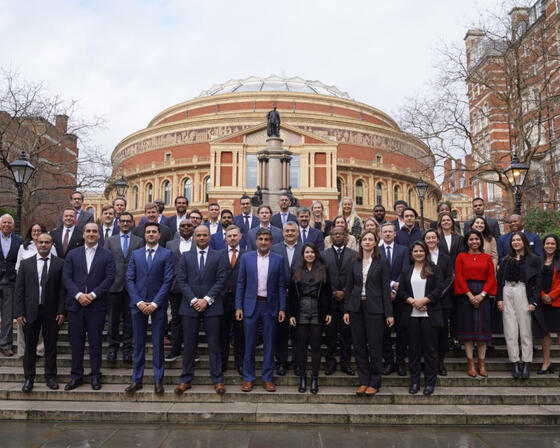
Meet the Executive MBA class of 2024-25
In February, we welcomed the newest additions to our Executive MBA programme at Imperial Business School. These ambitious individuals have commenced their transformative 22-month journey, dedicated to honing their leadership skills and broadening their global business acumen.
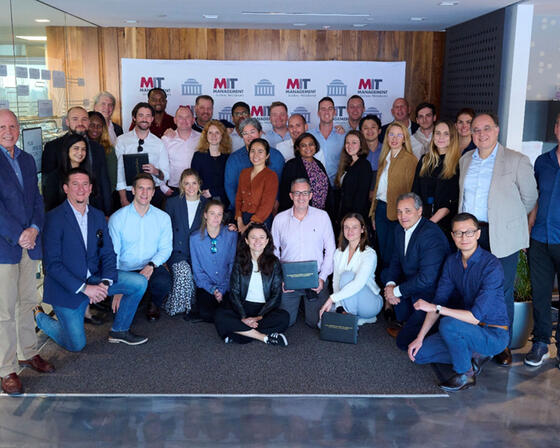
Technology and innovation in the US: my Executive MBA international residency experience
Executive MBA student Georges Panaghoulis shares his experience attending Imperial's international residency in the United States; the cohort visited the Massachusetts Institute of Technology (MIT), Boston and Stanford University in San Francisco.